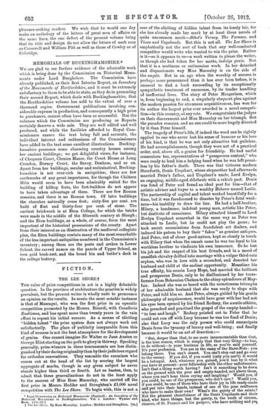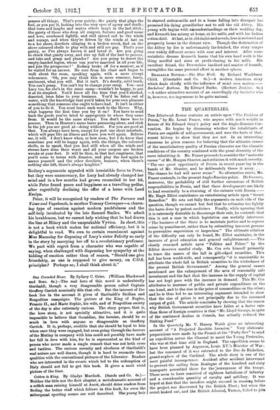THE value of prize competitions in art is a highly
debatable question. In the province of architecture the practice is widely prevalent, but the present writer is wholly unfit to pronounce an opinion on the results. In music the most notable instance is that of Maseagni, who won the first prize in an operatic competition promoted by the Messrs. Ricordi, with Cavalleria Eusticana, and has spent more than twenty years in the vain effort to repeat his initial success. As a means of eliciting "hidden talent" the prize system does not always work out satisfactorily. The glare of publicity inseparable from this kind of success is not the best atmosphere for the development of genius. One cannot imagine Sir Walter or Jane Austen or George Eliot starting on the path to glory in this way. Speaking generally, prize-tvinners in these tournaments are less distin. guished by their daring originality than by their judicious regard for orthodox conventions. They resemble the examinee who comes out at the head of the list by scoring the largest aggregate of marks, though in any given subject he never stands higher than third or fourth. Let us hasten, then, to admit that these generalizations do not in the least apply to the success of Miss Rose Macaulay, who carried off the first prize in Messrs. Hodder and Stoughton's £1,000 novel competition with The Lee Shore. To begin with, this is not a • Royal Commission on Historical Monuments (England) : An inventory of the Platoriced Monuments in Buckinghamshire. Vol. i. London: Wyman and Bons. [i5o. ed.] The Lee Shore. By Bose Macaulay. London : Hodder and Stoughton. [Gal case of the eliciting of hidden talent from its lonely lair, for she has already made her mark by at least three novels of quite uncommon merit—Abbot's Verney, The Furnace, and Views and Vagabonds. But this is not all. The Lee Shore is emphatically not the sort of book that any well-conducted competitor would write who wanted to win the prize. Rather is it—so it appears to us—a work written to please the writer, as though she had taken for her motto, indulge genio. Not that it is a mutinous or antinomian work. In her detached and dispassionate way Miss Macaulay is on the side of
the angels. But in an age when the worship of success is perhaps more pronounced than it has ever been before, it is unusual to find a book succeeding by its exceptionally sympathetic treatment of unsuccess, by its tender handling of ineffectual lives. The story of Peter Margerison, which is, from beginning to end, a singularly eloquent plea against the modern passion for strenuous acquisitiveness, has won for its author the largest prize ever awarded in a novel competi- tion—in this country, at any rate. We congratulate the judges on their discernment and Miss Macaulay on her triumph. But the paradox remains, and no one could be more hugely diverted by it than Peter himself.
The tragedy of Peter's life, if indeed the word can be rightly applied to one who never lost his sense of humour or his love of his kind, is that he was not only attractive but guileless. He had accomplishments, though they were not of a practical order, and, above all, a genius for friendship. He had useful connexions too, representatives of "prosperous content," who were ready to lend him a helping hand when he was left penni- less by his father's death. There was that virtuous modern Steerforth, Denis Urquhart, whose stepmother had afterwards married Peter's father, and ITrquhart's uncle, Lord Evelyn, an engaging, middle-aged daettante with a rakish past. Denis was fond of Peter and found an ideal post for him—that of artistic adviser and buyer to a wealthy Hebrew named Leslie. The partnership of capital and talent worked beautifully for a time, but it was foredoomed to disaster by Peter's fatal weak- ness—his inability to draw the line. He had a half-brother, Hilary, a handsome, indolent young man, artistic like Peter, but destitute of conscience. Hilary attached himself to Lord Evelyn Urquhart somewhat in the same way as Peter was attached to Leslie, but he could not play the game ; he took secret commissions from fraudulent art dealers, and induced bis patron to buy their " fakes " as genuine antiques.
And Peter, out of sheer good-nature, kept so closely in touch with Hilary that when the smash came he was too loyal to his
worthless brother to vindicate his own innocence. So he lost his job and the respect of his best friends, and in a mood of
unselfish chivalry drifted into marriage with a vulgar third-rate orphan, who was in love with a scoundrel, and deserted her husband and child at the earliest opportunity. Meantime his true affinity, his cousin Lucy Hope, had married the brilliant and prosperous Denis, only to be disillusioned by her trans- ference from Bohemian Chelsea to the shiny splendours of May- fair. Indeed she was so bored with the monotonous triumphs of her admirable husband that she was ready to elope with Peter, and told him so. And Peter, always guided by his gentle philosophy of acquiescence, would have gone with her had not his eyes been opened by his friend Rodney, the ascetic athlete, who preached and practised the gospel of the empty-handed- " to lose and laugh." Rodney pointed out to Peter that he could not run off with Lucy because he was too fond of Denis; also that Lucy was the only person who could emancipate Denis from the tyranny of luxury and well-being; and finally because it would be an act of desertion:—
" But, deeper than that, to me more insurmountable than that, is the true reason, which is simply that that very thing—to lose, to do without—is your business in life, as you've said yourself. It's your profession. You are in the camp of the Have-Nots : you belong there. You Can't desert. You can't step out and go over to the enemy. If you did, if you could (only you can't) it would be a betrayal. And, whatever you gained, you'd lose by it what you have at present—your fellowship with the other unfortunates. Isn't that a thing worth having ? Isn't it something to be down on the ground with the poor and empty-handed, not above them, where you can't hear them crying and laughing? Would you, if you could, be one of the prosperous, who don't care ? Would you, if you could, be one of those who have their joy in life ready-made and put into their hands, instead of one of the poor craftsmen who have to make their own ? What's the gaiety of the saints ? Not the pleasant cheerfulness of the Denis Urqnharts and their kind, who have things, but the gaiety, in the teeth of circum_ stances, of St. Francis and his paupers, who have nothing and yet
possess all things. That's your gaiety; the gaiety that plays the fool, as you put it, looking into the very eyes of agony and death ; that loses and laughs and makes others laugh in the last ditch ; the gaiety of those who drop all cargoes, fortune and good name and love, overboard lightly, and still spread sail to the winds and voyage, and when they're driven by the winds at last on to a lee shore, derelicts clinging to a broken wreck, find on the shore coloured shells to play with and still are gay. That's your gaiety, as rve always known it and loved it. Are you going to chuck that gaiety away, and rise up full of the lust to possess, and take and grasp and plunder ? Are you going to desert the empty-handed legion, whose van you've marched in all your life, and join the prosperous ? ' Rodney broke off for a moment, as if he waited for an answer. He rose from his chair and began to walk about the room, speaking again, with a more abrupt vehemence. 'Oh, you may think this is mere romance, fancy, sentiment, what you will. But it isn't. It's deadly, solid truth: You can't grasp. You can't try to change your camp. You—and Lucy too, for she's in the same camp—wouldn't be happy, to put it at ite simplest. You'd know all the time that you'd shirked, deserted, been false to your business. You'd be fishes out of water, with the knowledge that you'd taken for your own pleasure something that someone else ought to have had. It isn't in either of you to do it. You must leave such work to the Haves. Why, what happens the first time you try it on ? You have to send back the goods you've tried to appropriate to where they came from. It would be the same always. You don't know how to possess. Then in Heaven's name leave possessing alone, and stick to the job you are good at—doing without. For you are good at that. You always have been, except for just one short interlude, which will pass like an illness and leave you well again. Believe me, it will. I don't know when, or how soon; but I do know that sometime you will be happy again, with the things, the coloured shells, so to speak, that you find still when all the winds and storms have done their worst and all your cargoes are broken wrecks at your feet. It will be then, in that last emptiness, that you'll come to terms with disaster, and play the fool again to amuse yourself and the other derelicts, because, when there's nothing else left, there's always laughter."
Redney's arguments appealed with irresistible force to Peter, but they were unnecessary, for Lucy bad already changed her mind and in a few months had grown reconciled to her lot, while Peter found peace and happiness as a travelling pedlar, after• regretfully declining the offer of a home with Lord Evelyn.
Peter, it will be recognized by readers of The Furnace and Views and Vagabonds, is another Tommy Crevequer—a charm- ing type of reaction against modern pushfulness and the self-help inculcated by the late Samuel Smiles. We admit his lovableness, but we cannot help wishing that he had drawn the line at Hilary and the unspeakable Vyviau. In short, this is not a book which makes for national efficiency, but it is delightful to read. We own to certain resentment against Miss Macaulay for disposing of Lucy's sister Felicity so early in the story by marrying her off to a revolutionary professor. We part with regret from a character who was capable of saying, when challenged with dispensing her sympathy at the bidding of emotion rather than of reason, " Should one give friendship, as one is supposed to give money, on C.O.S. principles ? Perhaps so; I shall think about it



















































 Previous page
Previous page